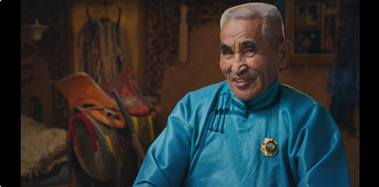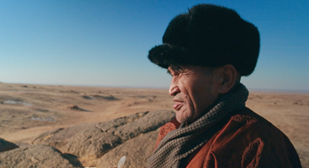Eighty-one-year-old Batmunkh Luvsandash spent decades working in the mining industry as an electrical engineer, but over time, he became increasingly alarmed by the destruction he witnessed firsthand. The mining of mineral deposits, spread across vast swaths of Mongolia’s fragile steppe, was tearing the land apart. Grasslands were eroding, wildlife habitats were being fragmented, and scarce water sources—already under pressure from climate change—were being depleted and polluted.
Batmunkh was born in 1944 into a nomadic herder family in the Dornogovi Province, in Mongolia’s southeastern Gobi region. Growing up in that environment, he came to deeply understand the rhythms of the land—the harsh climate, the delicate balance of ecosystems, and the traditional herding ways that have sustained people for centuries. His education took him beyond the life of a herder. After excelling in mathematics and winning a provincial competition, he was able to study electrical engineering in Irkutsk, Russia. He worked for many years in construction and mining, including abroad, where he saw the environmental costs of large-scale development.
The short film Pride of the Gobi, directed by Will Parrinello of the Mill Valley Film Group, is a finalist at the MY HERO Film Festival. In the documentary, Batmunkh’s transformation from engineer to environmental defender is vividly portrayed. The film documents how his activism led to the establishment of a major protected area in Dornogovi Province home to several endangered species and unique desert flora.”
For his activism, Batmunkh received the prestigious Goldman Environmental Prize for Asia in 2025.
The film begins with stunning cinematography of the Eastern Gobi Desert - a land of high desert steppe, windswept mountains, and expansive grasslands that, we are told, have supported nomadic herders for generations.
Batmunkh tells us: “I grew up here, helping my family and herding livestock. I am fortunate to have been born in such a wonderful place. My land is home to diverse plant and animal life unique to the Gobi. We have many endangered species here…If the land continues to be dug up illegally, we’ll be left with no land to graze our animals.”
 Batmunkh LuvsandashWill Parrinello
Batmunkh LuvsandashWill Parrinello
We learn that in 2015, the Mongolian government granted mining leases on large areas surrounding Dornogovi’s sacred mountains, despite existing laws requiring license revocation in culturally significant zones. Troubled by the lack of enforcement, Batmunkh conducted extensive legal research and discovered that ordinary citizens have the right to take action to protect the environment.
One of Batmunkh’s strengths was combining his engineering and local herder background: using both scientific methods and traditional ecological knowledge. He did his own mapping - literally walking the land, using natural features (streams, mountain tops) to define boundaries. He also built alliances with NGOs (notably The Nature Conservancy) and government bodies, presenting proposals rooted in both law (Mongolia’s constitution and environmental protection statutes) and in community rights and culture.
Now retired from his job, he knew exactly how to spend his free time. People often ask, "Why do you care so much about the land?" And I answer, because my very existence and place of birth are inseparable."
Batmunkh began using his own funds and his engineering background to survey the desert. He identified ecologically important areas, created hand-drawn maps delineating zones that he believed should be protected.
 Will ParrinelloThe Gobi
Will ParrinelloThe Gobi
His efforts culminated in a major victory in April 2022 when the Mongolian government approved a protected area of about 66,000 acres in Dornogovi province, forbidding extractive industries in that land. This new reserve joins several other nearby protected zones (secured earlier between ~2019-2020), which together make up over 205,000 acres of contiguous protected land.
These areas are critical habitat for endangered species, including the Asiatic wild ass (of which ~75% of the global population is found in his protected area), Argali sheep, and a wide variety of native plants. They also help preserve water resources, maintain grazing areas for herder communities, and protect culturally sacred sites (notably Hutag or Khutag Mountain), which hold spiritual significance.
Unfortunately, the protected areas Batmunkh helped establish still face significant threats. One of the most pressing challenges is ensuring that mining truly stops and that environmental protections are enforced across these vast, remote regions.
Water scarcity is another critical concern. Mining is extremely water-intensive, and in regions like Dornogovi, where water is already scarce, the overuse and contamination of groundwater can devastate both ecosystems and herding livelihoods. These pressures are compounded by the effects of climate change—increasing aridity, advancing desertification, and more extreme weather events—all of which make life on the steppe more fragile.
Finally, there are deep economic pressures. Mongolia’s economy depends heavily on its mineral wealth, and political and commercial interests continually push to weaken protections, open new territories for extraction, or relax environmental standards.
Despite these challenges, Batmunkh’s commitment and the recognition he received through the Goldman Environmental Prize have strengthened the momentum for conservation in Mongolia. His ongoing work continues to inspire communities to defend their land and to remind policymakers that sustainable progress must never come at the expense of the natural world.
Page created on 10/14/2025 2:01:20 PM
Last edited 10/15/2025 5:52:40 PM
